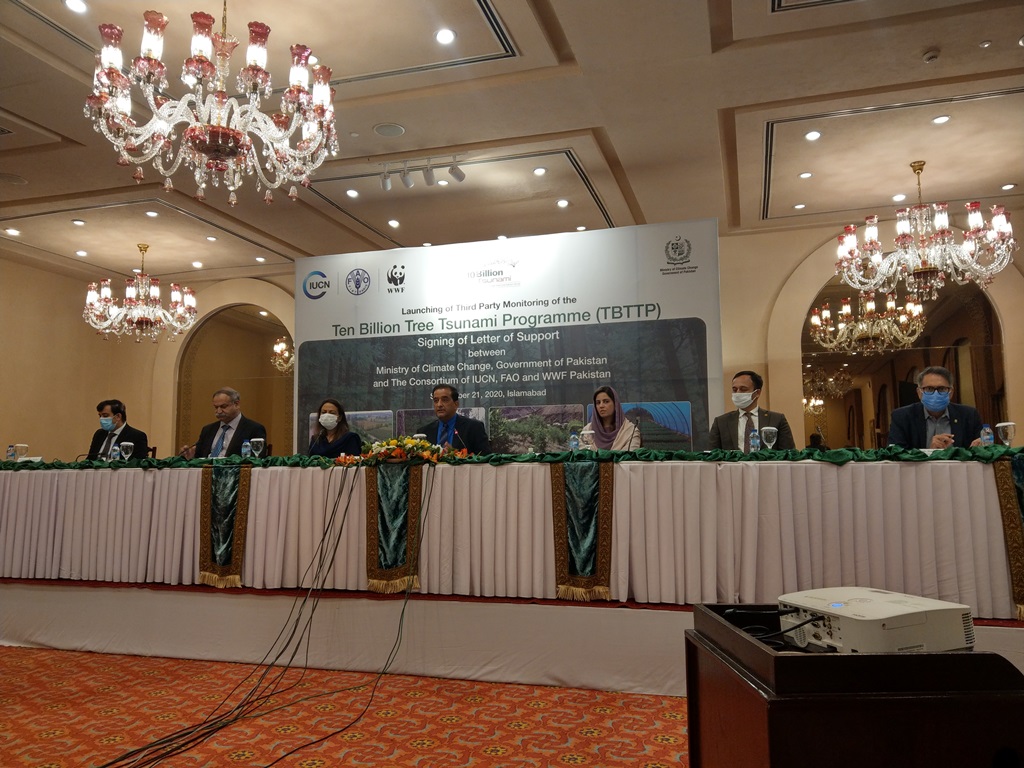Steps Needed to Mitigate Coastal Erosion Threats to Communities through Scientific Approaches
A national consultative workshop to discuss findings of and debate on a national assessment report on Coastal Erosion in Pakistan concluded on Wednesday, with experts and stakeholders urging management of coastal zones of Pakistan in a more scientific manner.
The workshop, organized by IUCN, International Union for Conservation of Nature, in collaboration with Climate Change Division of the Government of Pakistan, invited stakeholders representing the coastal development agencies of Sindh and Balochistan, civil society, NGOs working in coastal areas, the media and academia. Mr. Sajjad Saleem Hotiana, Chief Secretary, Government of Sindh, was the chief guest on this occasion. The purpose of the workshop was to review and finalize the draft National Assessment Report on Coastal Erosion in Pakistan with input from relevant stakeholders.
The workshop was part of the two-year regional project “Strengthening the Resilience of Coastal Communities, Ecosystems, and Economies to Sea-Level Rise and Coastal Erosion”, funded by Mangroves for the Future (MFF) Initiative. The project focuses on two countries - Thailand and Pakistan – and is being implemented by the United Nations Environment Programme (UNEP) and the Coordinating Body of the Seas of East Asia (COBSEA) in collaboration with National Partner Institutions in Thailand and Pakistan.
The Project aims to develop practical knowledge in climate change adaptation, assess needs and gaps of the participating countries, and prioritize interventions for strengthening the resilience of coastal ecosystems and communities against coastal erosion. It will also prioritize needs in legislation, policies, institutional structures and capacities, for addressing coastal erosion in Pakistan and Thailand. The financial contribution by MFF is USD 200,000, paired with a planned co-financing of approximately USD 200,000 from KOICA Yeosu Project (for the wider COBSEA region) and USD 40,000 as an in-kind contribution from UNEP COBSEA.
In Pakistan, Climate Change Division, Islamabad is acting as the National Focal Agency for supervising and guiding the implementation of the Project activities through IUCN Pakistan.
Climate change is an emerging challenge with far reaching consequences for the developing countries – in particular their coastal areas, which run the highest risk of being drastically impacted by climate-change-related extreme events, such as sea level rise, flooding and erosion.
“Given the scale of the adverse impacts of climate change, intensive collaborative efforts are needed to promote sustainable management of coastal resources, as no single initiative or agency can address all of these issues single-handedly,” said Chief Secretary Mr. Hotiana during his keynote address. “In order to respond effectively to the threat of sea erosion, scientific and environmental aspects of sea-level rise and its induced coastal erosion need to be fully studied and understood,” he added.
“I hope the preparation of National Assessment Report on Coastal Erosion will play a catalyst's role in drawing the attention of coastal stakeholders and policy makers to this emerging problem in Pakistan and will strengthen regional collaboration,” noted Mr. Hotiana.
Dr. Wong Poh Poh, Consultant UNEP-COBSEA, stated in his presentation: “The National Assessment Report will not only address coastal erosion but will also be a major document and reference in the development of new plans, policies, strategies and programmes on integrated coastal management.”
Syed Mahmood Nasir, Inspector General Forests, Government of Pakistan, highlighted the significance of the National Assessment Report, describing it as a crucial document that would pave the way for practical strategies and a road map for addressing coastal erosion.
In her remarks, Ms. Aban Marker Kabraji, IUCN Regional Director Asia, said: “IUCN has been making steady efforts towards planting trees along the vulnerable coasts across the region, as mangroves act as a major protection against sea level rise in low-lying inland areas.” Ms. Kabraji also underscored the need for conducting studies on the extent of tree-coverage required along the coasts prior to the plantation of mangroves.
In his welcome address, IUCN Pakistan Country Representative Mr. Mahmood Akhtar Cheema said, “IUCN has been taking necessary steps towards promoting institutional collaboration at the national and regional levels – and is actively engaged in the conservation of coastal mangrove ecosystem in collaboration with provincial forest departments of Sindh and Balochistan contributing to minimizing the negative impacts of climate change– such as coastal erosion and sea erosion."
About Mangroves for the Future Initiative
Mangroves for the Future (MFF) is a unique partner-led initiative to promote investment in coastal ecosystem conservation. In December 2006 President Bill Clinton planted the first mangrove tree to launch the MFF initiative at a fishing village on Phuket Island, Thailand. At the launch of the Tsunami Legacy Report (2009) in the United Nations in New York In April 2009, Bill Clinton said that MFF has been one of the most positive and forward-looking developments since the tsunami. MFF provides a collaborative platform among the many different agencies, sectors and countries who are addressing challenges to coastal ecosystem and livelihood issues, to work towards a common goal. It initially focused on the countries worst-affected by the tsunami; India, Indonesia, Maldives, Seychelles, Sri Lanka, and Thailand. MFF member countries now include Cambodia, Pakistan and Viet Nam.
www.mangrovesforthefuture.org, https://www.facebook.com/mangrovesforthefuture
For further Information, please contact:
George Sadiq
Programme Officer, Education, Communications & Outreach
IUCN Pakistan Country Office
1-Bath Island Road
Karachi-75530
Tel: 021-35861540-2
Fax: 021-35861448
www.iucn.org







